
Journal of Cognitive Education and Psychology
Scope & Guideline
Connecting Research and Real-World Application in Psychology
Introduction
Aims and Scopes
- Cognitive Development in Education:
The journal publishes studies examining how cognitive development theories can be integrated into educational practices, such as the application of Vygotsky's theories and metacognitive strategies in teaching. - Assessment and Measurement of Cognitive Skills:
Research on the effectiveness of various assessment methods, including testing and feedback mechanisms that enhance cognitive skills and metacomprehension, is a core focus. - Bilingualism and Learning Difficulties:
The journal explores the cognitive functions of bilingual children and those with specific learning difficulties, providing insights into their educational needs and strategies for improvement. - Mathematical and Literacy Skills Development:
There is a strong emphasis on innovative methods and interventions aimed at improving mathematical reasoning and literacy skills among young learners, including the use of games and e-books. - Metacognition in Learning:
Studies that investigate the role of metacognitive strategies in learning processes, particularly how they affect reading literacy and problem-solving skills, are a significant part of the journal's scope. - Innovations in Educational Practices:
The journal encourages research on innovative educational practices, particularly in STEM education for early childhood, reflecting a commitment to advancing teaching methodologies.
Trending and Emerging
- Integration of Technology in Learning:
There is a growing trend toward exploring how technology, such as e-books and interactive games, can enhance cognitive skills and educational outcomes, particularly in mathematics and literacy. - Focus on Executive Functions:
Recent studies increasingly examine the role of executive functions in learning contexts, particularly in relation to problem-solving and cognitive processing in children, indicating a deeper understanding of how these skills influence educational success. - Emphasis on Metacognitive Strategies:
The importance of metacognitive strategies is gaining traction, with research focusing on how these strategies can be taught and utilized to improve literacy and comprehension skills among students. - Multilingual Education and Cognitive Development:
Research on the cognitive implications of bilingualism and multilingual education is emerging, particularly regarding how these factors influence executive functions and learning processes in diverse classroom settings. - Innovative Teaching Strategies:
There is an increased focus on innovative teaching strategies that promote engagement and cognitive development, such as structured inquiry and the use of thinking maps based on Bloom's taxonomy.
Declining or Waning
- Traditional Learning Methods:
There seems to be a waning interest in traditional learning methods without cognitive foundations, as more research is focusing on innovative and evidence-based practices that align with cognitive theories. - Generalized Educational Psychology:
The broader themes of educational psychology that do not specifically address cognitive processes or practical applications in education are becoming less prominent, as the journal emphasizes more targeted cognitive studies. - Static Assessment Techniques:
Research centered around static or non-interactive assessment techniques is declining, with a shift towards dynamic assessment methods that consider cognitive and emotional aspects of learning.
Similar Journals
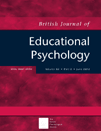
BRITISH JOURNAL OF EDUCATIONAL PSYCHOLOGY
Transforming educational practices through research.The British Journal of Educational Psychology (BJEP), published by Wiley, stands as a leading platform in the fields of Developmental and Educational Psychology and Education. Since its inception in 1931, BJEP has consistently delivered high-quality, peer-reviewed research that addresses critical issues and advances knowledge within the educational sphere. With a commendable impact factor and a prominent Q1 ranking in both the Developmental and Educational Psychology categories, the journal boasts an impressive standing among its peers, reflected by its rankings in Scopus (Rank #101 out of 1543 in Social Sciences – Education and Rank #35 out of 360 in Developmental Psychology). Researchers, educators, and students alike will find valuable insights and innovative practices that shape learning and teaching in diverse contexts. Although currently not available as open access, the journal remains dedicated to disseminating pivotal findings that contribute to effective educational psychology practices worldwide. Explore the rich tapestry of knowledge that BJEP offers, crafted from contributions across the globe at the forefront of educational research.
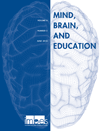
Mind Brain and Education
Bridging Neuroscience and Learning for a Brighter FutureMind, Brain, and Education is a pioneering journal published by WILEY, focusing on the intersection of cognitive neuroscience, developmental psychology, and educational practices. With an ISSN of 1751-2271 and E-ISSN 1751-228X, this esteemed publication offers a platform for researchers and educators to disseminate innovative findings that bridge theory and practice in learning environments. Spanning from 2008 to 2024, the journal has established a reputation as a vital resource in the academic community, recognized in 2023 as Q2 in Developmental and Educational Psychology and Education, and Q3 in Cognitive Neuroscience and Experimental and Cognitive Psychology. With Scopus ranks demonstrating its impact, especially in Education and Psychology fields, Mind, Brain, and Education invites submissions that advance knowledge and application of educational strategies informed by brain science. Researchers, professionals, and students will find critical insights and collaborative opportunities to enhance educational outcomes and cognitive development in learners.
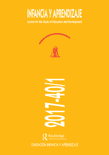
Journal for the Study of Education and Development
Empowering educators with cutting-edge findings.The Journal for the Study of Education and Development, published by SAGE Publications Inc, is a leading academic peer-reviewed journal dedicated to advancing knowledge in the fields of educational and developmental psychology. Established in 1978 and operating through the United Kingdom, this journal provides a platform for contemporary research, theoretical discussions, and critical reviews that inform practices and policies in education. With an H-index reflecting its impact and citation metrics, it ranks in the Q3 category for both Developmental and Educational Psychology and Education as of 2023. Notably, it holds a Scopus rank of #722/1543 in Social Sciences - Education and #218/360 in Psychology - Developmental and Educational Psychology, placing it in the 53rd and 39th percentiles, respectively. The journal is committed to open access, ensuring that the insights found within its pages are readily available to researchers, professionals, and students alike. By contributing to ongoing dialogues and innovations in educational contexts, the Journal for the Study of Education and Development remains an essential resource for those looking to foster growth and development in educational settings.

LEARNING & BEHAVIOR
Innovating Understanding in Cognitive PsychologyLEARNING & BEHAVIOR is a distinguished academic journal published by SPRINGER that serves as a critical platform for the dissemination of research in the fields of behavioral neuroscience and cognitive psychology. With an ISSN of 1543-4494 and an E-ISSN of 1543-4508, this journal publishes high-quality, peer-reviewed articles that explore the complexities of learning processes and their behavioral implications. Despite its current Q4 status in Behavioral Neuroscience and Q3 in both Cognitive Neuroscience and Experimental and Cognitive Psychology, LEARNING & BEHAVIOR remains a valuable resource for researchers seeking to enhance their understanding of these dynamic fields. The journal has a converged publication timeline from 2003 to 2024, ensuring that it captures emerging trends and innovative methodologies. With robust accessibility options for a diverse readership, the journal fosters a comprehensive academic environment, inviting submissions that contribute to theoretical advancements and practical applications in understanding behavior. Authors and readers are encouraged to leverage this journal to engage with cutting-edge research that drives the behavioral sciences forward.
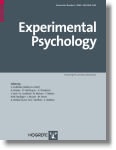
EXPERIMENTAL PSYCHOLOGY
Illuminating human behavior through groundbreaking studies.EXPERIMENTAL PSYCHOLOGY is a premier journal dedicated to advancing the field of psychology through rigorous empirical research and innovative theoretical insights. Published by HOGREFE PUBLISHING CORP, this esteemed journal features an array of studies that delve into cognitive processes, experimental methodologies, and the intricate workings of human behavior. With a significant impact factor, EXPERIMENTAL PSYCHOLOGY holds a Q1 ranking in Arts and Humanities and maintains a commendable presence in the realms of Experimental and Cognitive Psychology. By providing Open Access options, the journal ensures that vital psychological research is widely accessible, fostering collaboration and knowledge sharing among researchers, practitioners, and students worldwide. Based in the United States, it has been a cornerstone of psychological literature since 1998, continuing to shape the discourse in its diverse and interdisciplinary scope. Researchers seeking to contribute to or stay informed about the latest advancements in psychological science will find EXPERIMENTAL PSYCHOLOGY an invaluable resource.

Metacognition and Learning
Transforming Education Through Cognitive UnderstandingMetacognition and Learning is a premier academic journal published by Springer, dedicated to advancing research in the fields of education and cognitive psychology. Since its inception in 2006, this journal has consistently maintained a prestigious position, achieving a Q1 ranking in Education for 2023, underscoring its influential role in the dissemination of innovative ideas and empirical findings. With an ISSN of 1556-1623 and E-ISSN of 1556-1631, it provides a vital platform for scholars to explore the intricate relationships between metacognitive processes and learning outcomes, thereby enriching pedagogical practices and educational strategies. Although it is not open access, the insights offered in its publications are invaluable for researchers, educators, and practitioners who seek to enhance learning and teaching through a deep understanding of metacognition. The journal is headquartered in New York, United States, at One New York Plaza, Suite 4600, where it continues to foster a vibrant community of learning enthusiasts and contribute significantly to the academic landscape through its robust editorial standards and diverse contributions.

Rivista di Psicolinguistica Applicata-Journal of Applied Psycholinguistics
Empowering Research in Language and Psychology.Rivista di Psicolinguistica Applicata - Journal of Applied Psycholinguistics is a distinguished journal dedicated to exploring the intersections of psychology and linguistics, making significant contributions across various subfields of psycholinguistics and its applications. Published by Fabrizio Serra Editore in Italy, this journal presents a repository of innovative research, theoretical advancements, and practical applications relevant to developmental and educational psychology, linguistics, and social psychology. Although currently listed in Q4 for Developmental and Educational Psychology and Q4 for Social Psychology, the journal has achieved a respectable Q3 ranking in Linguistics and Language, reflecting its commitment to enhancing understanding within these realms. With an E-ISSN of 1724-0646, the journal facilitates accessibility to its content, empowering scholars and practitioners to stay abreast of emerging trends and findings. The impact factor of the journal is poised for growth as it seeks to amplify its reach and influence within the academic community, appealing to researchers, professionals, and students who have a vested interest in the dynamic field of applied psycholinguistics.

Journal of Cultural Cognitive Science
Shaping the Future of Cultural Cognitive ResearchThe Journal of Cultural Cognitive Science, published by SpringerNature, is an esteemed forum for researchers and scholars dedicated to exploring the intersection of culture, cognition, and language. With its ISSN 2520-100X and E-ISSN 2520-1018, this journal has made significant strides since its inception in 2017, covering a wide array of topics pertinent to Experimental and Cognitive Psychology and Linguistics and Language. Notably, it has achieved remarkable recognition, ranking in the Q3 category for Experimental and Cognitive Psychology and Q1 for Linguistics and Language in 2023. Its Scopus ranks further illustrate its impact, with the journal positioned at the 89th percentile in Social Sciences - Linguistics and Language and 47th percentile in Psychology. Despite its ongoing journey, it continues to foster open dialogue and innovation among professionals, researchers, and students, providing valuable insights and advancing knowledge in the field.
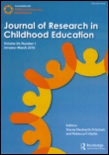
Journal of Research in Childhood Education
Empowering educators through impactful research.The Journal of Research in Childhood Education, published by Routledge Journals, Taylor & Francis Ltd, is a prestigious academic journal that has been at the forefront of childhood education research since its inception in 1986. With an ISSN of 0256-8543 and E-ISSN 2150-2641, this journal serves an essential role in disseminating findings and discussions pertinent to the fields of developmental and educational psychology, as demonstrated by its notable rankings in the 2023 Scopus Ranks, placing it in the 66th percentile of Educational Social Sciences and 49th percentile in Developmental Psychology. With a current Q2 category quartile designation in both Developmental and Educational Psychology and Education, it aims to foster a deeper understanding of the complexities surrounding childhood education practices and policies. Researchers, educators, and students alike will find robust and insightful research that contributes to advancing educational theories and practices, supporting the journal's mission to enhance the overall quality of education for children globally. This journal continues to be a critical resource for individuals passionate about enhancing early childhood education and comprehending the developmental challenges faced by children today.
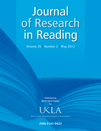
JOURNAL OF RESEARCH IN READING
Illuminating the path to effective reading instruction.JOURNAL OF RESEARCH IN READING, published by Wiley, stands as a premier scholarly platform dedicated to advancing the understanding of reading research within the disciplines of education and psychology. Established in 1978, this impactful journal offers rigorous peer-reviewed articles that explore the multifaceted nuances of reading processes, literacy development, and instructional strategies, making it an essential resource for educators, psychologists, and researchers alike. With an impressive Q1 ranking in developmental and educational psychology, education, and miscellaneous psychology categories, and notable positions in Scopus rankings, the journal maintains a strong reputation for the quality and relevance of its contributions to the field. Although it operates under a traditional subscription model, the journal ensures broad access to its vital research findings, supporting the ongoing dialogue in an ever-evolving academic landscape. As it approaches its landmark 2024 edition, JOURNAL OF RESEARCH IN READING continues to serve as a vital conduit for innovative research and critical insights into literacy and reading education.